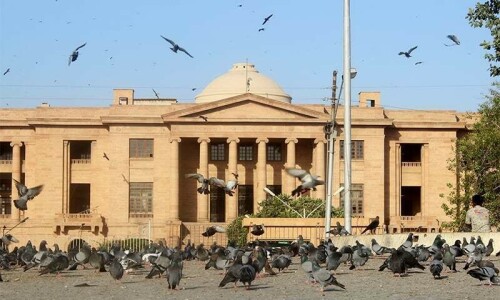
In early summer, fishermen from Kotri visit the shrine of Syed Mehmood Ali Shah Bukhari, also known as Zinda Pir or ‘The Living Saint’, in Sukkur. They return with a fistful of soil from the sacred ground. It is mixed with kutti, a traditional sweet prepared with crumbled bread, pure ghee and coconut, and thrown into the River Indus to ensure a good fishing season.
This custom is also believed to improve the taste of palla, a particular variety of fish that is revered in local lore as much as it is sought after for its commercial lucre. The area around Kotri Barrage in Jamshoro is the breeding ground of the palla fish.
At 6pm, Majeed Mallah, a daily-wage fisherman from Kotri, has returned from a laborious fishing trip on the Indus with his three sons and four other fishermen, on two little boats or batella. Although they only caught a foot-long palla or ilish fish, he is happy. None of the other fishing boats parked along the riverbank caught any.
According to Majeed Mallah, palla is cooked in sand, fried on a griddle, barbecued, cooked as a traditional curry or with rice. “Its eggs or aani are also considered a delicacy,” he explains. He gently presses the abdomen of his catch: a thick ghee-like fluid oozes out proving that it is a female palla or anyari. “In a male palla or kheero,” he says, “a drop of white milky fluid or kheer appears.”
The palla fish occupies an exalted position in Sindhi cuisine and folklore. But inconsistent water flow downstream of Kotri and obsolete fishing methods are leading to a dwindling catch
The palla lays eggs in the sweet waters of the Indus. “It swims upstream from the Arabian Sea as the hard and brackish seawater does not support palla breeding,” explains Soomar Mallah, a 70-year-old fisherman, helping his son Gaji prepare for the evening fishing trip. “Since water is released downstream of Kotri Barrage, in late July or August only for a short period, palla breeding suffers.”

“It is essential for the entire ecosystem that the Indus water must reach the delta at least in mid-May or earlier,” says Dildar Meerani, district president of the Sindh Mallah Forum. Palla breeding is dependent on early and uninterrupted water flow downstream of Kotri. When water is released downstream from Kotri into the sea, the palla swims upstream for breeding. As this has not been happening for the past few years, the palla catch has reduced steeply.
Obhayo Khushik, a retired irrigation engineer and water expert from Thatta explains the conditions favourable for water release downstream of Kotri. “Because of water scarcity, IRSA [the Indus River System Authority] prioritises irrigation and domestic needs of the upper riverine area of Punjab and Sindh,” he says. “In early summer, as the water level in the Indus rises, the Tarbela dam is filled and surplus water is released downstream of Kotri in late July and August. This year, no water was released downstream Kotri until heavy rains in July. But by then the prime breeding time of palla in the Indus delta, which is in May and June, was over.”
Meerani points out that since the Indus didn’t flood in the last four years, the palla available in Hyderabad, Jamshoro and Thatta markets was imported from Iran while some of it was from Gwadar. “Iranian palla is a smaller, blackish, saltwater fish and not as tasty as the freshwater palla from the Indus,” he says.
The Indus palla is silver with faded, black stripes. According to Dr Punhal Lashari, Associate Professor of Freshwater Biology and Fisheries at the University of Sindh, a fully grown palla is usually two years old and weighs 1.5kg to 2kg.
Majeed Mallah tells Eos that the mark of a ‘genuine’ fisherman is that he will never weigh a palla out of reverence for the fish. Soomar Mallah explains the distinction among the fisherfolk. “People from other communities and castes have entered the fishing business over time, but we do not consider them ‘genuine’ fishermen,” says Soomar Mallah. For generations, fishing has been the profession of the Mallah community who belong to the Mirbahar caste.

Majeed Mallah says that no matter the size, the palla is a fish that is priceless. “Connoisseurs often buy it to gift to dear ones, as a token of love and respect,” he says. “With time, it has become a commercial fish, like other common fish of River Indus, and is sometimes put on a weighing scale. One fish can weigh anywhere from 250g to two kilos and occasionally three kilos.”
The larger palla is relatively more expensive as it is tastier. A foot-long Indus palla costs around 3,000 rupees in the market. A one-kg palla is for about 5,000 rupees when purchased directly from the fishermen, but more when purchased in city markets with added mark-ups.
“Many customers contact us directly to purchase fresh palla,” says Majeed Mallah. “When there is a fair catch during peak season in June and early July, the middleman takes the produce from the boat to sell in the market at higher prices. Without a middleman, we get more money and the customers spend less.”
The catch has to be sold daily, as the fisherman have no chilling facilities available and they cannot afford freezers. “If palla could be stored for a few days, we could avoid the middlemen’s exploitation to some extent,” says Majeed Mallah.
Half of the income received from the sale of palla goes to the owner of the boat while the remaining half is distributed equally among the daily-wage workers.
In Kotri, the fisherfolk believe that cutting off the palla tail and preserving it until the next fishing season brings prosperity. It is also believed that leaving the eyes and scales on the fish when it is cooked is partly a token of respect and love for palla and partly because every part of the fish is considered edible and delicious.
“We cannot afford the luxury of buying palla,” says Soomar Mallah. “But the first palla of the season is not sold. We cook it in the finest way possible and share it with family and relatives.”
Ramzan Mallah who works on Majeed’s boat, along with two other workers, will only get 500 rupees for the fish caught by Majeed that day. “It is very hard for me to feed a family of eight,” he says. “A boat costs around 250,000 rupees, but I don’t have the capital to buy one of my own.”
Outdated fishing methods, poor equipment and lack of training in modern fishing techniques are among other factors affecting the palla catch. “We use centuries-old netting techniques. We want to learn efficient fishing methods,” says Majeed Mallah. “Netting material has become very expensive. Sometimes we are lucky to catch five to six fish, and sometimes we don’t have a single catch and we return empty-handed to our family, waiting for us to make the evening meal.”
Kotri’s fishermen are unaware of the existence of the Sindh Government’s fisheries department or the Directorate of Fisheries Inland in Hyderabad. Local fishermen organisations such as the Sindh Mallah Forum have no say at the policy level, nor do they have the capacity and experience to support fishermen.
But if the issues of the timely release of downstream water, promoting fisheries and allied aquaculture, training in modern fishing, storage, marketing and sufficient credit availability systems are addressed, the palla, which is intrinsic to Sindhi cuisine, could be shared with the rest of the world.
The writer teaches economics at the University of Sindh, Jamshoro, and can be reached at ali.gul@usindh.edu.pk
Published in Dawn, EOS, September 18th, 2022













































